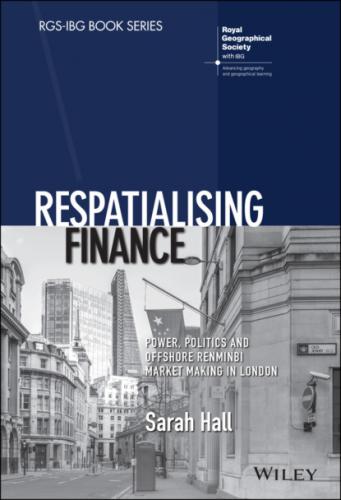132 120
133 121
134 122
135 123
136 124
137 125
138 126
139 127
140 128
141 129
142 130
143 131
144 132
145 133
146 134
147 135
148 136
149 137
150 138
151 139
152 140
153 141
154 142
155 143
156 144
157 145
158 146
159 147
160 148
161 149
162 150
163 151
164 152
165 153
166 154
167 155
168 156
169 157
170 158
171 159
172 160
173 161
174 162
175 163
176 164
177 165
178 166
179 167
180 168
181 169
182 170
183 171
184 172
185 173
186 174
List of Figures
Figure 4.1 Monetary form, geographical reach and policy basis of RMB internationalisation
Figure 5.1 Renminbi business of UK monetary financial institutions (2015–2020, £m)
Figure 5.2 RMB foreign exchange daily turnover in London by instrument (2015–2020, £m)
Figure 5.3 Timeline of London’s development as an offshore RMB centre
Figure 6.1 National insurance registrations of Chinese nationals by London borough 2002–2016
Figure 6.2 Location of Chinese financial and related professional service firms in London’s financial district
List of Tables
Table 4.1 Attributes of leading offshore RMB centres
Table 4.2 List of interviewees
Table 5.1 Factors accounting for the identification of London as the first western offshore RMB centre
Table 6.1 Big four Chinese commercial state-owned banks operating in London, by Tier 1 capital
Table 7.1 RQFII licences issued in London 2013–2014 (RMBbn)
Table 7.2 Allocated and used RQFII quotas by country (US$bn)
Series Editors’ Preface
The RGS-IBG Book Series only publishes work of the highest international standing. Its emphasis is on distinctive new developments in human and physical geography, although it is also open to contributions from cognate disciplines whose interests overlap with those of geographers. The Series places strong emphasis on theoretically-informed and empirically-strong texts. Reflecting the vibrant and diverse theoretical and empirical agendas that characterize the contemporary discipline, contributions are expected to inform, challenge and stimulate the reader. Overall, the RGS-IBG Book Series seeks to promote scholarly publications that leave an intellectual mark and change the way readers think about particular issues, methods or theories.
For details on how to submit a proposal please visit:
Ruth Craggs, King’s College London, UK
Chih Yuan Woon, National University of Singapore
RGS-IBG Book Series Editors
David Featherstone
University of Glasgow, UK
RGS‐IBG Book Series Editor (2015–2019)
Acknowledgements
The research that underpins this book draws on an extensive period of fieldwork conducted with policymakers and financiers working in London and Beijing dating back to 2015. I would like to thank all the people I interviewed who gave up their time to be interviewed and talked me through the issues they were facing in their everyday work with care and patience. As a result, I learnt more about the intricacies of RMB internationalisation and London’s role within it than I could have ever done through reading secondary sources. Over the course of the research, I shared these insights with Fenghua Pan, and I would like to express thanks for Fenghua for sharing his incredible knowledge of the Chinese banking and financial system with me and hosting me at the early stages of the project at Beijing Normal University.
The research would not have been possible without the financial support of The British Academy through a Mid-Career Fellowship (award number MD 13006) and a period of research leave from the School of Geography at the University of Nottingham that gave me the time to learn about RMB internationalisation and London’s role within it. My colleagues at the University of Nottingham have been extremely supportive in terms of giving me the time to undertake this work and I would particularly like to thank Louise Crewe, Shaun French and Andrew Leyshon who have supported me through the good times and the trickier ones. The arguments presented here have benefited from conference audiences at a number of events where I presented preliminary ideas. I would particularly like to thank those at the Universities of Durham, Manchester, Cambridge and Newcastle as well as colleagues who attended meetings of the Royal Geographical Society with the Institute of British Geographers, the American Association of
